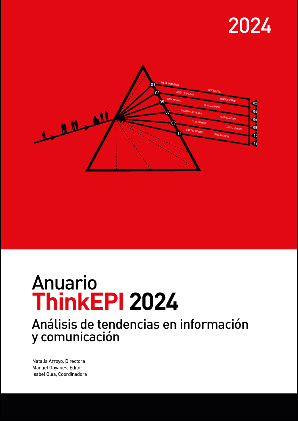Looking at collaborative curation of structured knowledge on Wikidata
DOI:
https://doi.org/10.3145/thinkepi.2024.e18a35Keywords:
Wikidata, Knowledge organization, Taxonomies, Metadata schema, Resource description, Data reuseAbstract
Specific aspects relevant to understanding the functioning of Wikidata from the perspective of the collaborative organization of knowledge are reviewed. Collective curation poses challenges in data modeling and quality. Wikidata has the capacity to incorporate taxonomies and controlled vocabularies, but problematic practices are identified in the use of classes/subclasses and instances. The difficulties in establishing metadata schemas, creating consistent descriptions of elements, and using it as a bibliographic database are also described. Additionally, an overview is provided of the paradoxes created by licensing in the public domain and its use as a dataset for enriching next-generation artificial intelligence applications.Downloads
References
Baroncini, Sofia; Martorana, Margherita; Scrocca, Mario; Śmiech, Zuzanna; Polleres, Axel (2022). “Analysing the evolution of community-driven (sub-)schemas within Wikidata”. Wikidata’22: Wikidata workshop at ISWC. https://wikidataworkshop.github.io/2022/papers/Wikidata_Workshop_2022_paper_9582.pdf
Bianchini, Carlo; Sardo, Lucia (2022). “Wikidata: a new perspective towards universal bibliographic control”. Italian journal of library, archives and information science, v. 13, n. 1, pp. 291-311. https://doi.org/10.4403/jlis.it-12725
Candela, Gustavo; Cuper, Mirjam; Holownia, Olga; Gabriëls, Nele; Dobreva, Milena; Mahey, Mahendra (2024). “A systematic review of Wikidata in GLAM institutions: a labs approach”. In: Antonacopoulos, Apostolos; Hinze, Annike; Piwowarski, Benjamin; Coustay, Mickaël; Di-Nunzio, Giorgio-Maria; Gelati, Francesco; Vanderschantz, Nicholas. Linking theory and practice of digital libraries. TPDL 2024. Lecture Notes in Computer Science, v. 15178. Springer, Cham. https://doi.org/10.1007/978-3-031-72440-4_4
Farda-Sarbas, Mariam; Müller-Birn, Claudia (2019). Wikidata from a research perspective - A systematic mapping study of Wikidata. arXiv. https://doi.org/10.48550/arxiv.1908.11153
Johnson, Isaac; Kaffee, Lucie-Aimée; Redi, Miriam (2024). “Wikimedia data for AI: a review of Wikimedia datasets for NLP tasks and AI-assisted editing”. Wikipedia Workshop at EMNLP ‘24. https://doi.org/10.48550/arXiv.2410.08918
Krötzsch, Markus (2018). “Ontological modelling in Wikidata”. In: Knowledge-based systems, TU Dresden. Workshop on Ontology Design and Patterns. https://iccl.inf.tu-dresden.de/w/images/e/ed/Ontology_modelling_Wikidata_Markus_Kroetzsch_WOP2018.pdf
Luggen, Michael; Audiffren, Julien; Difallah, Djellel; Cudré-Mauroux, Philippe (2021). “Wiki2Prop: A multimodal approach for predicting Wikidata properties from Wikipedia”. In: Proceedings of the Web Conference 2021 (WWW ‘21). Association for Computing Machinery, New York, pp. 2357–2366. https://doi.org/10.1145/3442381.3450082
McDowell, Zachary J.; Vetter, Matthew A. (2024). “The realienation of the Commons: Wikidata and the ethics of ‘free’ data”. International journal of communication, v. 18, pp. 590–608. https://ijoc.org/index.php/ijoc/article/view/20807
Mora-Cantallops, Marçal; Sánchez-Alonso, Salvador; García-Barriocanal, Elena (2019). “A systematic literature review on Wikidata”. Data technologies and applications, v. 53, n. 3, pp. 250-268. https://doi.org/10.1108/DTA-12-2018-0110
Open Knowledge (2024). Open movement’s common(s) causes: Report from a Wikimania 2024 side event. Open Future; Creative Commons; Open Knowledge Foundation; Wikimedia Europe. https://blog.okfn.org/2024/11/18/report-open-movements-commons-causes/
Pintscher, Lydia (2024). “Wikidata query service - the way forward for getting the most out of Wikimedia’s knowledge graph”. In: Wikimania 2024. https://upload.wikimedia.org/wikipedia/commons/3/31/Wikimania_2024_Wikidata_Query_Service_-_the_way_forward_for_getting_the_most_out_of_Wikimedia%27s_knowledge_graph.pdf
Piscopo, Alessandro; Phethean, Christopher; Simperl, Elena (2017). “Wikidatians are born: paths to full participation in a collaborative structured knowledge base”. In: Proceedings of the 50th Hawaii International Conference on System Sciences 2017. http://hdl.handle.net/10125/41688
Piscopo, Alessandro; Simperl, Elena (2018). “Who models the world?: Collaborative ontology creation and user roles in Wikidata”. Proceedings of the ACM on human-computer interaction, v. 2. https://doi.org/10.1145/3274410
Shenoy, Kartik; Ilievski, Filip; Garijo, Daniel; Schwabe, Daniel; Szekely, Pedro (2022). “A study of the quality of Wikidata”. Journal of web semantics, v. 72, 100679. https://doi.org/10.1016/j.websem.2021.100679
Sigalov, Shani-Evenstein; Nachmias, Rafi (2023). “Investigating the potential of the semantic web for education: Exploring Wikidata as a learning platform”. Education and information technologies, v. 28, pp. 12565–12614. https://doi.org/10.1007/s10639-023-11664-1
Tharani, Karim (2021). “Much more than a mere technology: A systematic review of Wikidata in libraries”. The journal of academic librarianship, v. 47, n. 2. https://doi.org/10.1016/j.acalib.2021.102326
Turki, Houcemeddine; Hadj-Taieb, Mohamed-Ali; Ben-Aouicha, Mohamed; Rasberry, Lane; Mietchen, Daniel (2023). “Ten years of Wikidata: A bibliometric study”. In: Wikidata’23: Wikidata Workshop at ISWC. https://ceur-ws.org/Vol-3640/paper13.pdf
Aenor (2014). UNE 25964:2014. Tesauros e interoperabilidad con otros vocabularios. Parte 1: Tesauros para la recuperación de la información. Madrid: Aenor, 2014. Equivalente a ISO 25964-1:2011.
Vrandečić, Denny; Pintscher, Lydia; Krötzsch, Markus (2023). “Wikidata: The making of”. In: WWW’23 Companion: Companion Proceedings of the ACM Web Conference 2023, April 30–May 04. ACM. ISBN: 978 145039419 https://doi.org/10.1145/3543873.3585579
Vrandečić, Denny (2020). “Collaborating on the sum of all knowledge across languages”. Wikipedia@20. https://wikipedia20.mitpress.mit.edu/pub/svu3uy1z/release/2
Zhao, Fudie (2022). “A systematic review of Wikidata in digital humanities projects”. Digital Scholarship in the Humanities, v. 38, n. 2, pp. 852-874. https://doi.org/10.1093/llc/fqac083
Downloads
Published
How to Cite
Dimensions


